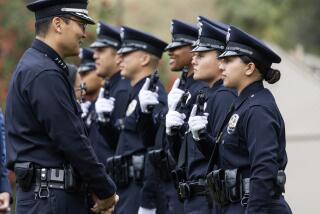The Value of Outside Eyes on Police : Lesson from L.A. beating: Stronger, more public review process is needed
- Share via
It’s a nagging question we can’t quite ignore. Do police beatings, like the one caught on videotape in Los Angeles, happen in San Diego?
San Diego Police Chief Bob Burgreen says he knows of no similar incidents here. But last year’s 12 fatal shootings by city police and others by law enforcement officers elsewhere in the county, combined with the lingering memory of a Rambo squad of deputies accused of abusing jail inmates, leaves room for doubt.
Those doubts became a little less vague recently when a former member of the city’s police review board wrote a letter to city leaders in which he alleged that the type of beating Rodney G. King suffered by Los Angeles police officers earlier this month “is meted out by officers of the San Diego Police Department with a distressing degree of regularity.”
The long letter by Don McEvoy went on to say that “Dirty Harry is alive and well in the precincts, the patrol cars, and many of the neighborhoods of San Diego.” Burgreen called the charges outrageous.
We hope so. But we can only accept the Police Department’s word.
We have no other way of knowing. The city’s police review board is not allowed to conduct its own investigations, and the state “policeman’s bill of rights” prohibits releasing the results of the board’s reviews.
With such a situation, the general public has virtually no way of knowing the outcome of internal investigations of alleged police misconduct.
It’s a situation that needs correcting. As the King case has shown, police reports can be deceptive.
McEvoy raised a few more doubts about the Citizens’ Review Board on Police Practices last week when he, and another former board member, Barbara Schutze, said they were not reappointed because they had publicly criticized police.
City Manager Jack McGrory said neither were singled out, but he would give no specific reason why the two were removed.
General criticism--which does not violate officers’ “rights”--is the only avenue open to review board members for letting the public know about problems they see. If it is not tolerated, the board’s effectiveness will be further hampered. That would be going in the wrong direction. What is needed is a stronger, more public review process.
If the Rodney King case teaches us anything, it is the value of outside eyes on police work.
More to Read
Sign up for Essential California
The most important California stories and recommendations in your inbox every morning.
You may occasionally receive promotional content from the Los Angeles Times.













